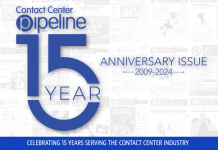
The idiom “add fuel to the fire” dates back to Roman times. The expression, as defined by the American Dictionary of Idioms, means to “worsen an already bad situation, as by increasing anger, hostility or passion.”
Let’s face it… handling customers day after day in any contact center can yield the same inevitable and unpleasant result. The manner in which combustible situations are managed or avoided depends on the skill of those handling the contact. Here is my suggested approach—organized in 3D!
- Depersonalize
- De-escalate
- Deduce
DEPERSONALIZE
Depersonalize has been part and parcel of nearly all written material related to maintaining professional poise and avoiding “adding fuel to the fire” within a challenging interaction. What does this mean? How do we pull this off within a deteriorating and downward spiraling situation?
First of all, DO NOT wait until confronted with a challenge to master the skill of depersonalization. Challenge your own inner voice. If you find yourself conducting an internal dialogue at work about how awful the job is, how stupid everyone else is, how irritating customers are, how “nit-picky” management is, or about any other topic that causes stress in your life or the life of others… STOP IT! This is a difficult choice for those who may prefer to hold fast to the reality they are creating. However, this mindset is a blockade to depersonalization.
Depersonalize means to condition yourself to observe situations within a business context. Keep in mind that customers do not know you; the issue is NOT ABOUT YOU. Any customer contact at risk has some basis in the dissatisfaction, disappointment, confusion, etc.
You must WANT to interact in a way that leads to a successful outcome. When one wants to produce professional results, an objective is put in place, one that will alter internal dialogue to search for opportunities rather than reactions to situations. This is a skill that may or may not be part of your company’s training program. To achieve it means figuring out the current state of your “depersonalization score” and being deliberate in managing your state of mind to support your own professional development needs.
DE-ESCALATE
De-escalate means “to reduce in magnitude,” and it is closely associated with depersonalization. De-escalation calls for awareness of a situation’s volatility, and this requires the ability to depersonalize. Far too many customer interactions deteriorate because of the manner in which they are handled. Certain people have an uncanny ability to aggravate other people. Generally speaking, there is no recovery in these situations. Individuals handling customer interactions who “add fuel to the fire” do it through clear aggression, passive aggression, lack of interest or anger. They set up a situation from which there is no retreat. They also rely on blaming the customer rather than considering that the entire situation was theirs to manage and they failed.
I never cease to be amazed as both a consumer and a consultant by the way that customer service situations are handled by those with no self-awareness of their responsibility to avoid escalating an already tough situation. This is often demonstrated by deciding to chastise the customer… “calm down,” “the information is right in your warranty,” “you claim to have made a deposit,” and on and on.
Word choice matters when attempting to de-escalate. Poor choices—due to lack of focus on the business need or on maintaining professional poise—may yield results that the individual is comfortable with or which may have worked in the past. But they will NOT support delivering an excellent customer experience.
De-escalation can be fun! There is a certain thrill in being able to take an angry customer and manage the interaction to an appropriate outcome. This is not to say that you should just grant whatever request is being made. It means gaining clarity on exactly what the issue is and offering alternatives, understanding and guidance as to what you can do. Getting into a debate on what you can’t do is an exhausting and ineffective choice… it is fuel!
DEDUCE
Deduce means “to decide by reasoning.” This is the ultimate methodology for avoiding situations that flare out of control. When reasoning is considered, critical thinking is applied. Critical thinking involves conditioning yourself to think about the individual’s situation, its impact on them and what the real, underlying issue is. It means that you must listen, pay attention, ask open-ended questions and avoid “communication enemies,” such as distortion, dilution and generalization.
Deductive reasoning requires a focus on the person being served rather than the person providing the service. Getting to the crux of the matter by integrating depersonalization, deliberate de-escalation and deductive reasoning will fuel resolution and douse the flames.



